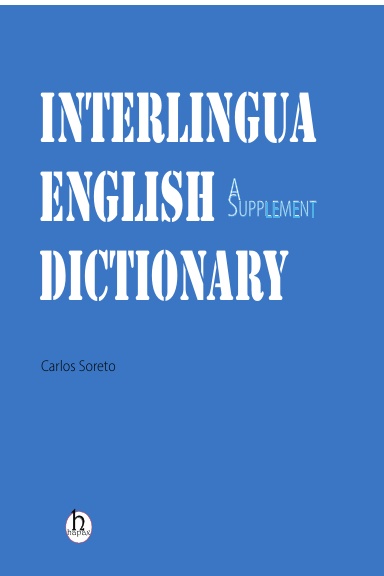§1. The LETTERS used are the conventional twenty-six letters of the roman alphabet. There are no extra signs and symbols to indicate stress and pronunciation.
| A | B | C | D | E | F | G | H | I | J | K | L | M | N | O | P | Q | R | S | T | U | V | W | X | Y | Z |
| a | b | c | d | e | f | g | h | i | j | k | l | m | n | o | p | q | r | s | t | u | v | w | x | y | z |
Quanto à norma de pronunciação, Gode e Blair, os autores de Interlingua Grammar (da qual se faz aqui a transcrição do Capítulo «Spelling and Pronunciation), dizem que é «continental» (afastando-se, assim, das idiossincrasias do inglês), e sendo fluido o valor fonético das letras (embora com amplitudes variáveis, deve-se ter alguma atenção...). Chamam ainda a atenção para a influência que um som pode ter de acordo com o fone vizinho e também para a influência que os hábitos pessoais poderão ter na pronúncia.
§2. The NORM OF PRONUNCIATION is "continental". The sound values of the various letters are fluid within type limits. They may be naturally influenced by neighboring sounds as also by native habits of individual speakers. For instance, the sound of u - described in the phrase, "like u in 'plural'" - may well be pronounced like oo in "good" or in "loom" but not like u in "stutter" or in French "lune".
Por outro lado, deve prestar-se atenção também ao modo como se pronunciam as vogais não acentuadas (tonicamente) e, em especial, a pronunciação do «e» final.
§3. The tendency of English speakers to obscure unstressed voewls, making them all sound like a in "China", should be guarded against. This applies particularly to final e. No sound, final or otherwise, unstressed or stressed, should be undully slurred over.
A pronúncia normal do inglês, como de várias outras línguas, está de acordo a pronúncia da interlíngua no que respeita às seguintes letras e dígrafos: b, d, f, k, l, m, n, p, ph, qu, v, w e z. As particularidades das restantes letras e dígrafos serão analisadas mais detalhadamente à frente, de acordo com as regras definidas por Gode e Blair e tendo como fonte de controlo a pequena, mas assaz importante, gramática do recém-falecido Karel Wilgenhof.
§4. The normal English pronunciation agrees with that used in the interlingua for the letters b, d, f, k, l, m, n, p, ph, qu, v, w, and z. The remaining letters are covered by the following rules and observations:
a is always pronounced like a in English 'father';
c before e, i, y is pronounced like ts in 'hats' (or, optionally, like c in 'city'); otherwise like c in 'cats'; ch like ch in 'echo', 'chrome';
e always like e in 'met' or, better, like é in French 'risqué';
g like g in 'good';
h as in English (or, optionally, silent); after r and t, silent;
i normally like i in 'machine'; when unstressed before a vowel, like i in 'onion' or in 'phobia'); e.g. bile, biliose, varie;
j like z in 'azure' (or, optionally, like g in 'gem' or like y in 'yes');
o always like o in 'obey';
r like rr in 'merry' or, better, like r in Spanish 'caro';
s like s in 'stay'; between vowels, the same (or, optionally, like s in 'these'); e.g. sparse, abstruse, accusativo;
t as in English; ti before vowels, unless stressed or preceded by s, like tsy in 'he gets you' (or, optionally, like sy in 'we pass you' or like ty in 'we let you'); e.g. actor, garantia, question, but action, reverentia;
u normally like u in 'plural'; when unstressed before a vowel, like u in 'persuade' or in 'superfluous'; e.g. plural, persuader, superflue;
x like x in 'fox'; between vowels, the same (or, optionally, like x in 'exact');
y unstressed before vowels, like y in 'yes'; otherwise like i in 'machine'; e.g. Yugoslavia, typo.
As vogais mantêm o valor dos seus sons próprios quando formam ditongos; no entanto, devem-se ter em atenção algumas excepções.
§5. In DIPHTHONGS the vowels retain their independent sound values. The diphthong ai is pronounced as in "kaiser", au as in "kraut". Stressed e and i are separated by a syllabic break [hiatus] from a following a, e, o; e.g. mie, io, spondeo, via, bastardia. Unstressed i and u turn into semiconsonants before a following vowel; e.g. Bulgaria, filatorio, persuader.
Se se usar o chamado estilo ortográfico clássico, não há necessidade de se escreverem consoantes duplas como bb, dd, ff, mm, nn ou pp; porém, os dígrafos cc e ss devem ter uma atenção especial.
§6. DOUBLE CONSONANTS merge in pronunciation. The double consonant ss is always voiceless like ss in "miss". The sounds of g and k assimilate a preceding n as in english. Note that the double consonant cc is spelled c at the end of a word (siccar but sic).
Ainda sobre a pronunciação de palavras que se desviam das regras anteriores, os autores da IG dão mais alguns exemplos de palavras com dígrafos e remetem para as indicações dos casos particulares que se encontram no IED (Interlingua-English Dictionary).
§7. Pronunciations deviating from these norms are indicated in the Interlingua-English Dictionary by a system of respelling in which the letters have the same sound values as in interlingua. The digraph ch stands frequently for the sound of sh in "English" and is respelled as sh; e.g. choc (sh-). The combination gi often represents the sound of z in "azure" and is respelled as j; e.g. avantagiose (-ajo-). Simple g has this sound and hence this repselling in the suffix -age; e.g. avantage (-aje).
Para os interessados nestes desvios ortográficos, transcreveu-se o §137 da IG.
§8. ON ORTHOGRAPHIC CHANGES IN DERIVATION, SEE §137 BELOW.
§ 137. In most instances the joining of stem and affix is a mattar of simple juxtaposition. When de stem ends in -i- and the suffix begins with the same vowel, the full derivative is spelled with only one -i-: rubie "red" plus -ificar > rubificar "to redden, make red."
Note that the addition of suffixes with initial vowels to stems ending in -c- may change the sound value of that consonant. When through derivation an originally hard c (as in franc) comes to preced i or e, its pronuntiation changes as a rule to soft c (as in Francia). Inversely, when an optionally soft c (as in cortice "bark") comes through derivation to precede an a or o, its pronunciation changes as a rule to hard c (as in cortical). However, a soft c remains soft c before the suffixes -ada, -ata, -age, -alia, -astro, -astra and must be spelled -ci-: nuce ("nut") plus -ada > nuciada. Similarly hard c remains hard c before the suffixes -eria, -ero, -esc, -ese, -essa, -etta, -ette, -etto, -iera, -iero, -issime, -issimo and must be spelled -ch-: porco ("pig") plus -eria > porcheria ("pork shop").
Note that the seeming irregularity of an example like ricchessa ("richess") < ric ("rich") is due to the fact that cc is spelled c when it appears at the end of a word.
Words ending in -age (whether this group of sounds be a suffix or not) retain the soft pronuntiation of -g- (like z in azure) in derivatives based on them. When the suffix begins in a or o the g is replaced by -gi-: orange plus -ada > orangiada; but orange plus -eria > orangeria "orange greenhouse".
A Gramática é bastante clara sobre as palavras estrangeiras: a sua pronunciação é (deverá ser) a mesma que elas possuem nas suas línguas originais. A sua grafia pode ser a grafia original ou, em alguns casos, podem perder os sinais diacríticos. [Exemplos: pt «autodefé» (por auto-de-fé), es «cañon», fr «à la carte», de «kümmel», mas «elite» (fr «élite»)]
§9. Unassimilated "GUEST WORDS," that is, foreign or borrowed words which are identified in the Interlingua-English Dictionary as to their origin, retain the pronunciation and spelling of the language of origin. The original diacritical signs are omitted when the resulting simplified spelling suffices to suggest the intended pronunciation; e.g. defaite for French défaite, but kümmel as in German.
Quanto à acentuação das palavras em interlíngua, deve prestar-se atenção a alguns desvios à norma, que consiste em colocar o acento tónico na vogal anterior à última consoante.
§10. The main stress is normally on the vowel before the last consonant. The plural ending does not change the original stress of the word. Adjectives and nouns ending in -le, -ne, and -re preceded by a vowel have the stress on the third syllable from the end; e.g. fragile, ordine, tempore. In words formed with the suffixes -ic, -ica, -ico, -ide, -ido, -ula, and -ulo, the stress falls on the syllable preceding the suffix. The suffixes -ific and -ifico are stressed on the first i.
Deviations from this stress system are covered in the Interlingua-English Dictionary by respelling with stress marks. Most of this deviations might be covered by additional descriptive rules. For instance, the suffixes -issim-, -essim-, -ifer-, and -olog- are stressed on the first vowel. The suffixes -ia, and -eria, in so for as they correspond to english -y and -ery, are stressed on the vowel i; etc.
Note: Words without consonant or without a vowel before the last consonant are stressed of necessity on the first vowel; i.e. io, via, and certain present-tense forms, as strue, crea, etc. But construe, procrea, etc. And also diminue, substitue, etc. follow the standard rule and have the stress on the vowel before the last consonant.
Aconselha-se a não exagerar nas regras de acentuação, sublinhando-se, todavia, que elas não devem ser deixadas ao acaso do gosto pessoal (embora em algumas situações os falantes se possam compreender bem uns aos outros, mesmo pronunciando uma palavra acentuada de uma maneira que não segue as prescrições dos autores da IG).
§11. The importance of stree regularity should not be exaggerated. The effort involved in acquiring an unfamiliar stress for an otherwise familiar word seems often inordinate. This does not, of course, imply that interlingua words may be stressed completely at random but merely that a word like kilometro remains the same international word whether native habits cause a speaker to stress it on the second or on the third syllable.
De igual modo, há situações em que é permitido que os hábitos pessoais prevaleçam em questões de entoação, duração do som da cadeia fónica, e outras. Neste ponto fornece-se, também, a sugestão quanto ao uso de glides.
§12. Native habits may likewise be allowed to prevail in questions of INTONATION, SOUND DURATION and the like. It is suggested, however, that the sequence of a final and an initial vowel, both unstressed and not separeted by a pause in intonation, be pronounced as a combened glide; e.g. le Alte ural almost as though it had the four syllables le-ál-teu-rál.
A silabação segue as regras da pronúncia normal, embora com algumas observações.
§13. SYLLABIFICATION follows pronunciation. Single consonants, except x, belong with the following syllable. Consonant groups are divided but l and r must not be separeted from preceding b, c, ch, d, f, g, p, ph, t, th, and v. The combination qu, gu, su behave like single consonantes.
A capitalização de palavras em interlíngua é diferente da maioria das línguas europeias. As letras maiúsculas quase que só são usadas em nomes próprios.
§14. CAPITALIZATION differs from English usage in that within the sentence upper-case initials occur exclusively with proper names but not with derivatives from them.
In Francia le franceses parla francese ab le initio de lor vita.
In France the French talk French from the start of their lives.
Em França os franceses falam francês desde o início das suas vidas.
Le piscatores del Mar Morte cape haringos salate.
The fishermen on the Dead Sea catch salt herrings.
Os pescadores do Mar Morto pescam arenques salgados.
Le ver stilo shakespearean se trova solmente in Shakespeare.
The true Shakespearean style is found only in Shakespeare.
O verdadeiro estilo shakesperiano só se encontra em Shakespeare.
No entanto, de acordo com algumas outras situações a capitalização também pode ser usada em designações com sentido histórico.
Since sacred terms, the names of religious and other holidays, designations of movements, eras, doctrines, etc. may be considered proper or common names, they are capitalized or not, depending on the meanining intended.
Le romanticismo de Hollywood es subinde insipide.
The romanticism of Hollywood is often insipid.
O romantismo de Hollywood é frequentemente insípido.
Le philosophia del Romanticismo cerca le reunion de sciencia e religion.
The phylosophy of Romanticism seeks the reunion of science and religion.
A filosofia do Romantismo procura a reunião da ciência com a religião.
As regras que se seguem não se encontram no Interlingua-English Dictionary e são regras simplificadas de acordo com o que vimos anteriormente.
§15. COLLATERAL ORTHOGRAPHY - The following rules, not observed in the Interlingua-English Dictionary, yield a simplified system of equal standing with that outlined in the preceeding paragraphs. All points not specifically covered below are to be kept unchanged; so for instance the treatment of unassimilated guest words whose orthography remains that used in the Interlingua-English Dictionary.
(a) Double letters representing a single consonant are simplified with the exception of ss. Note that the group cc before e, i, and y does not represent a single consonant. E.g. eclesia, aliterar, aducer, interogar (for ecclesia, alliterar, adducer, interrogar) but massa, transsubstantiation, accidente).
(b) The vowel y is replaced by i; e.g. tirano (for tyrano). The semi-consonant y remains unchanged; e.g. yak.
(c) The digraph ph is replaced by f; e.g. fonetic, emphatic (for phonetic, emphatic).
(d) The digraph ch, representing the sound of k, is kept only before e and i. Elsewhere it is replaced by c. E.g. cloric, Cristo (for chloric, Christo) but chimeric.
(e) The silent h after r and t is omitted. E.g. retoric, patetic (for rhetoric, pathetic).
(f) The letter j replaces g and gi to represent the sound of z in 'azure.' E.g. sajo (for sagio).
(g) The suffix -age (also the sound group -age at the end of a word where it is not a suffix) is replaced by the form -aje; e.g. saje, coraje (for sage, corage). The suffix -isar is replaced by the form -izar. Its derivatives are likewise spelled with z. E.g. civilizar, civilization (for civilisar, civilisation).
(h) Final e is dropped after t preceded by a vowel except in words which have the stress on the third syllable from the end; e.g. animat, brevitat (for animate, brevitate) but composite. This rule applies likewise to final e after n, l, and r when these consonants are the collateral spelling for nn, ll, and rr; e.g. peren, bel, mel, il, bizar (for perenne, belle, melle, ille, bizarre). Note: Present-tense and imperative forms are not affected by this rule; pote, permite, etc. retain their final -e.
Embora a pontuação não tenha qualquer regra fixa, ela deve, contudo, obedecer ao ritmo da frase falada. Os sinais usados na pontuação da interlíngua são os mesmos da maioria das línguas europeias (i.e., «! ? , ; .», etc.) e os seus valores são os valores que possuem na língua inglesa.
§16. PUNCTUATION reflects the rhythm of the spoken sentence and obeys no absolute rules. The signs of punctuation and their general values are the same as in English. Interpolated phrases and relative and conjunctional phrases are enclosed in commas unless the intended rhythm permits no break. In enumeration of more than two items, the use of e "and" or o "or" before the last item does not eliminate the comma.
Le homine que vos vide es mi patre.
The man you see is my father.
O homem que (vocês) vêem é (o) meu pai.
Le homine, qui se considera como le corona del creation, pare plus tosto facite de metallo blanc que de auro.
Man, who considers himself the crown of creation, seems rather to be made of babbit than of gold.
O homem, que se considera a coroa da criação, parece mais feito de metal branco do que de ouro.
Le asino, le can, e le catto formava un pedestallo pro le gallo.
The donkey, the dog, and the cat formed a pedestal for the rooster.
O burro, o cão e o gato formavam um pedestal para o galo.
Es isto le canto del asino, del can, del catto, o del gallo?
Is this the song of the donkey, the dog, the cat, or the rooster?
Isto é o canto do burro, do cão, do gato ou do galo?
Le Statos Unite, Anglaterra e su imperio, e Russia es tres del grande potentias.
The United States, England and its empire, and Russians are three of the great powers.
Os Estados Unidos, a Inglaterra e o seu império, e a Rússia são três das grandes potências.
Ille es, pro expimer lo cortesemente, pauc intelligente.
He is, to put it politely, not very intelligent.
Ele é, para o exprimir cortesmente, pouco inteligente.



 linguistic terminology
linguistic terminology












.jpg)




No comments:
Post a Comment